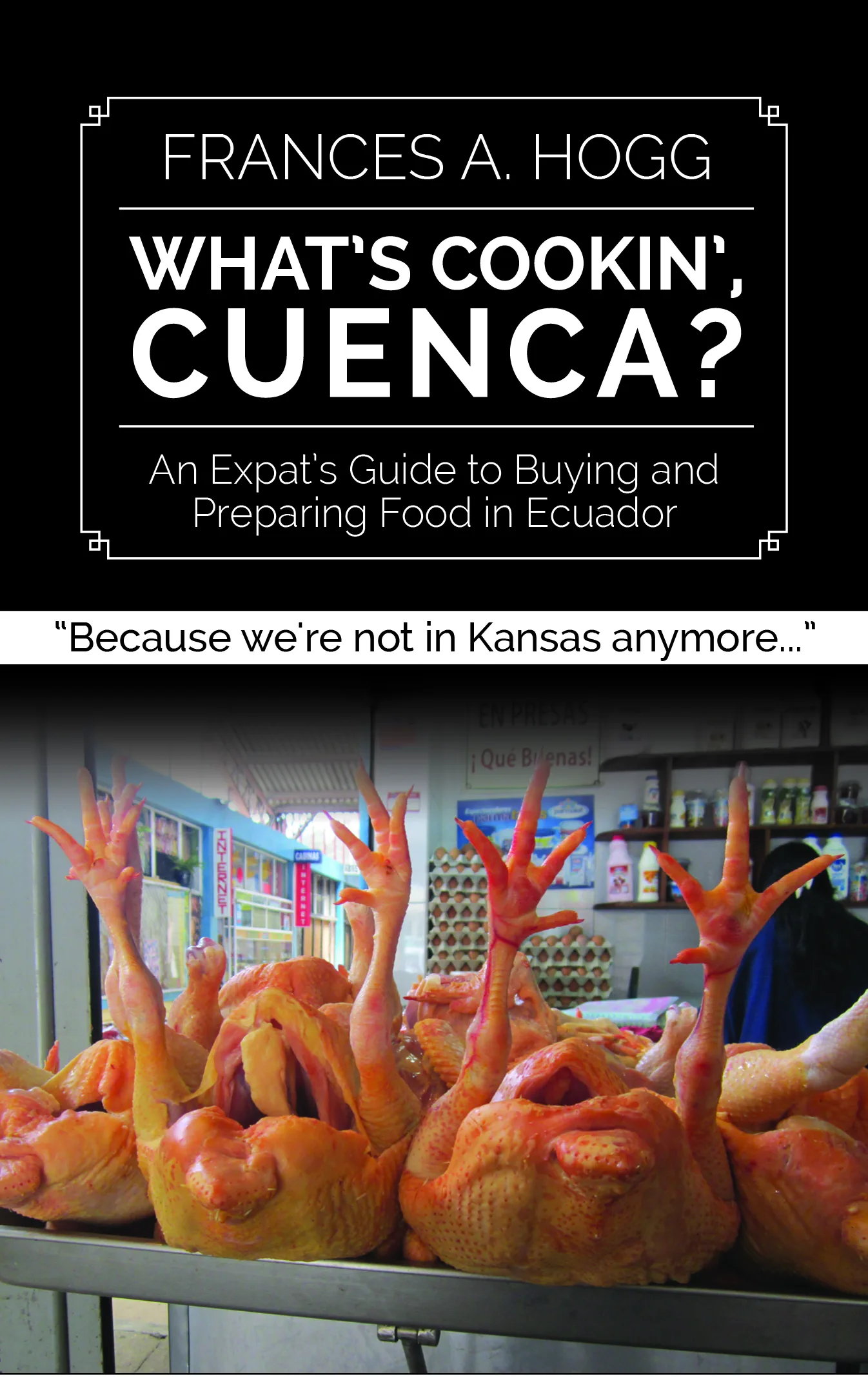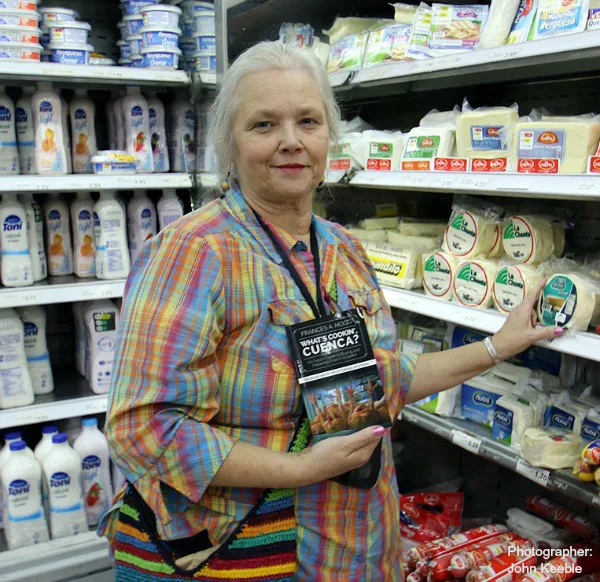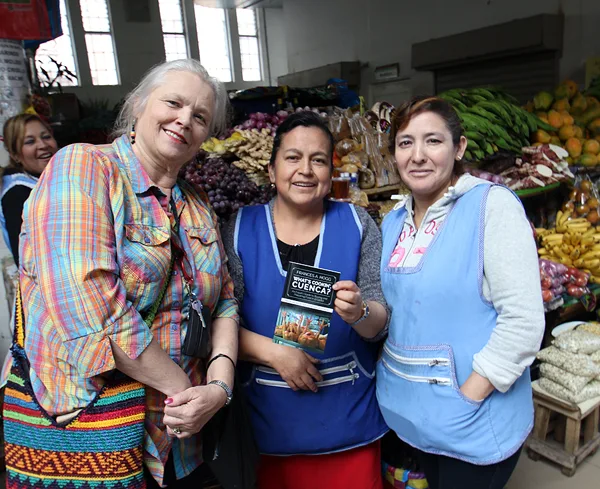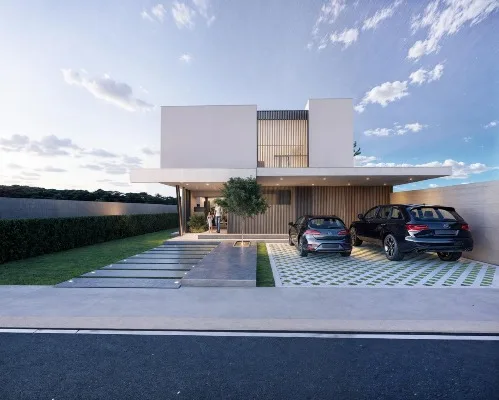It’s finally here! The paperback edition of What’s Cookin’, Cuenca?: An Expat’s Guide to Buying and Preparing Food In Ecuador!
By Frances A. Hogg
In Cuenca, it is rare to witness people arguing on the streets. Road rage is an anomaly and respect for others is an admired and expected trait. This pleasant state of tranquility eventually affects even the most angry, stressed-out and belligerent gringo. Over time, we realize that sarcasm and yelling get us nowhere, and we feel embarrassed when we see or hear about expats behaving badly. Sometimes we can even sense gringo tantrums coming and wish we could help avert them. This was my inspiration to write What’s Cookin’, Cuenca? An Expat’s Guide to Buying and Preparing Food in Ecuador.
 In 2012 I was new to Cuenca, checking out the markets and stores, comparing prices and trying to understand package labels. In the SuperMaxi store one day I looked up to see a shopping cart barreling toward me, steered by a large, red-faced gringo. He was enraged about something and I sensed an eruption at the checkout lane was imminent. I had to intervene.
In 2012 I was new to Cuenca, checking out the markets and stores, comparing prices and trying to understand package labels. In the SuperMaxi store one day I looked up to see a shopping cart barreling toward me, steered by a large, red-faced gringo. He was enraged about something and I sensed an eruption at the checkout lane was imminent. I had to intervene.
“Are you OK?” I asked.
“No!” he shouted. “These people don’t have any damned pancake mix!”
I tried to calm him, steered him to the correct aisle and pointed out the various brands available to him. I explained that pancake mix doesn’t always come in a box in Ecuador. It doesn’t always feature Aunt Jemima on the label, and it’s not called “pancake mix” in Spanish. I helped him choose a package and watched as the furious set of his jaw eased. His shoulders relaxed and so did mine. I had averted an ugly scene.
I realized it would be handy to have a pocket guide for shoppers and started asking friends about their shopping and cooking challenges upon moving to Cuenca. How many of them had assumed that salsa de tomate was tomato sauce, and had prepared a big batch of ketchup-covered pasta? How many had discovered after making a pot of chili with kidney beans that those beans were actually peanuts? How many were apoplectic at the idea that baking soda is illegal? (It isn’t…)

Franny at the supermarket.
At the time, my husband and I were living in a furnished apartment while we waited for our container to arrive. Our tiny kitchen was outfitted with little more than a few dishes and a frying pan. Preparing meals under those conditions was a challenge, but I didn’t want to waste a lot of money buying items for cooking and dining that I wouldn’t need when my own things arrived. I found that I enjoyed comparison shopping.
I collected questions about buying and preparing food, found the answers, and started to write the first version of What’s Cookin’, Cuenca? I discovered that even for expats with Spanish skills, difficulties exist. The same foods can have different names in Ecuador than in Mexico, Spain or Argentina, and in Cuenca, foods are sometimes known by their kichwa names. I received help from Ecuadorian friends Tatiana Donoso and Rocío Illescas to assure that my lists of translated names of foods and culinary and dining supplies are correct, locally.
I published the guide as a simple document download while I searched for an affordable means of printing a hard copy of the book. We found there are no easy print-on-demand opportunities in Ecuador. Things stalled, and over the course of four years, shopping opportunities in Cuenca changed. Stores have been responsive to expats’ more exotic food choices. Spices and condiments that had been rare here can now usually be found in the supermercados. But people still kept asking, “Where can I buy your book?” So Zero Latitude Books was established in conjunction with Gráficas del Sur Imprenta, to publish books by Cuenca authors.

Franny at the mercado.
A fun launch party for the new, updated paperback version of What’s Cookin’, Cuenca? An Expat’s Guide to Buying and Preparing Food in Ecuador will be held on Saturday, July 15, from 5 to 7 p.m., at El Fogón del Zorro’s new El Centro location, on northeast the corner of Presidente Córdova and Presidente Borrero. All are invited to enjoy hors d’oeuvres, music, and take advantage of the specially priced cash bar.
The 250-page book sells for ten dollars and contains explanations of differences in packaging and preparation of food; descriptions and locations of markets and stores; a glossary of culinary items and foods with their Spanish translations; cooking hints and interesting facts; and recipes for hard-to find foods from “the Old Country.” An e-book version containing color photographs is also available, by clicking on this link: https://www.smashwords.com/books/view/545542
I’m very pleased to finally be able to present my labor of love to the Cuenca community. Cooking and shopping, like everything else about our chosen life as expats in Ecuador, can be a fun!
_________________
Frances A. Hogg was a legal aid attorney in inner-city Detroit, an editor and animal rescue worker in New York, and now she is a volunteer teacher at CETAP, a rural school in Chicapamba, Ecuador. She is also the founder of the Cuenca Writers Collective.
Photos by John Keeble.





















